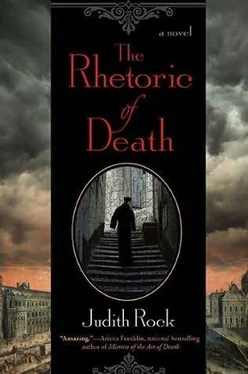Judith Rock - The Rhetoric of Death
Здесь есть возможность читать онлайн «Judith Rock - The Rhetoric of Death» весь текст электронной книги совершенно бесплатно (целиком полную версию без сокращений). В некоторых случаях можно слушать аудио, скачать через торрент в формате fb2 и присутствует краткое содержание. Жанр: Исторический детектив, на английском языке. Описание произведения, (предисловие) а так же отзывы посетителей доступны на портале библиотеки ЛибКат.
- Название:The Rhetoric of Death
- Автор:
- Жанр:
- Год:неизвестен
- ISBN:нет данных
- Рейтинг книги:3 / 5. Голосов: 1
-
Избранное:Добавить в избранное
- Отзывы:
-
Ваша оценка:
- 60
- 1
- 2
- 3
- 4
- 5
The Rhetoric of Death: краткое содержание, описание и аннотация
Предлагаем к чтению аннотацию, описание, краткое содержание или предисловие (зависит от того, что написал сам автор книги «The Rhetoric of Death»). Если вы не нашли необходимую информацию о книге — напишите в комментариях, мы постараемся отыскать её.
The Rhetoric of Death — читать онлайн бесплатно полную книгу (весь текст) целиком
Ниже представлен текст книги, разбитый по страницам. Система сохранения места последней прочитанной страницы, позволяет с удобством читать онлайн бесплатно книгу «The Rhetoric of Death», без необходимости каждый раз заново искать на чём Вы остановились. Поставьте закладку, и сможете в любой момент перейти на страницу, на которой закончили чтение.
Интервал:
Закладка:
Philippe is nearly at the river, she said, run if you want to catch him. Charles sprinted out of the college and along the rue St. Jacques. The night sky was as brilliant with stars as the sky in his mother’s old painted Book of Hours. All of Paris was silent, holding its breath until Philippe was found. Suddenly Charles saw him, running toward the Petit Pont, his yellow shirt shimmering in the starlight. Charles overtook him in a burst of speed and grabbed his shirt. Philippe spun around, laughing behind a half mask. Twisting out of Charles’s grip, he flung up his arm and the dagger in his hand flickered cold and bright.
Pain in his cheek woke Charles. He’d slumped down on the prie-dieu and the sharp edge of its little shelf, where his elbows should have been, was pressing into his face. The candle had gone out and Mary and the Child were as black as the wall. He got stiffly to his feet, shed his cassock, and felt his way to bed. As he slid under the covers, he made the sign of the cross against dreams or anything else that might try to follow him into the little death of sleep.
Chapter 9
When the rhetoric class began the next afternoon, Pere Jouvancy was still not there. Charles and Maitre Beauchamps shrugged worriedly at each other and set the boys to work. While the rest of the college enjoyed Saturday afternoon’s rest, the senior rhetoric class rehearsed grimly, still without a Hercules, in an atmosphere charged with unspoken questions over Philippe’s continuing absence. Beauchamps hissed scalding corrections through his teeth. The dancers were preternaturally quiet and made more mistakes than usual. At the other end of the room, Charles set the actors to relearn lines that had evaporated from their brains overnight and then stood watching Beauchamps. It was still not the moment to settle the clock problem, but there was obviously never going to be a right moment and he had to do it before Jouvancy returned.
When a pair of dancers finished capering through a piece of buffoonery as misguided Huguenots, Beauchamps gave the cast a short break and Charles beckoned him to the windows. Beauchamps heard him out without moving a muscle. Then he turned his head slightly and glared one-eyed at Charles, like a falcon considering a skinny rabbit.
“No clock? No clock? First we have no Hercules-oh, I had a new Hercules. A perfect Hercules. M. Louis Pecour, perhaps the most perfect dancer now alive. Who would be a better Hercules than Louis Pecour? No one. Who twisted his cursed ankle and will not be walking for a week, much less dancing? Louis Pecour. Now you say we are to have no clock. Perhaps no ballet master? No ballet?”
“No, maitre, no, not at all! But I agree with Pere Jouvancy that the clock will be too much for the boy who has to wear it. And since you have not even begun working with it yet-”
“It was late from the workshop. Someone smashed the first one. The boy is to begin wearing it today.”
“Maitre-once-at Carpentras-” Charles grimaced inwardly, wishing he hadn’t chosen an opening that sounded so much like “once on a time.” “We had a beautiful headdress-as your clock is, I’m sure-well, our headdress was for Fortune. A departure from Ripa’s design, you understand.”
Cesare Ripa’s book of characters and costume designs had guided ballet producers for nearly a century, and Charles knew it almost by heart. As Beauchamps certainly did, also.
Beauchamps blinked very slowly. “Really?”
“Yes, our headdress was a wheel.” Charles could hear his desperation making the story sound more like a fabrication with every word. “Fortune tried to wear the wheel, but he couldn’t manage it-not with the skirt and everything. Well, the headdress crashed to the floor and the audience laughed. And threw bottles, maitre!” Well, one bottle, and the thrower, when sober, had apologized abjectly and made a handsome contribution to the ballet expenses. But Charles didn’t see the need to say that. “So, you see, from my experience at Carpentras-”
“Pardon me. Your… experience, you call it?” Beauchamps made the word sound like someone’s dirty laundry. “A mere few years, Pere Jouvancy told me. In his Ancient and Modern Ballets, your own Pere Menestrier directs us to force dancers-force them, do you hear? — to wear the headdress that goes with the costume! My chiming clock goes with Time’s costume and Time will wear it.”
“But, maitre, Time does not even appear as a character in Pere Jouvancy’s livret-and, you must admit, the minuet he wants for the four seasons would be an easier way for student dancers to show the passing of time-”
“Spare me, Maitre du Luc. You well know that we’ve seen those same damn four seasons a hundred damn times in as many damn ballets! My clock will strike fear into the audience’s hearts. With their own ears they will hear time running out for heretics.” Beauchamps glared at Charles. “Time. Running out, Maitre du Luc. And not only for heretics.” He turned on his heel. “Here, you! Time!”
A slender Irish boy named Walter Connor, resting with the others on the floor, jumped to his feet. Beauchamps flung open a three-foot wooden chest his servant had brought and took out a long, bulky parcel swathed in coarse cloth. He unwrapped a perfect imitation of the sort of clock a rich man might have in his salon. Black and gold, solidly made of wire and papier-mache and fixed to a small leather cap, it was as tall as Charles’s forearm was long. Beauchamps placed it tenderly on Time’s dark curly head, tied the cap’s linen straps tightly under the boy’s spotty chin, and stepped back. “Now, M. Connor, as you dance your sarabande, you will tilt your head in perfect time on the first beat of each measure. Like this. A little right, a little left, a little right-you see? — so that the clock chimes. Do you have it? Good. Now.”
Connor clutched at the towering headdress. “No, maitre, wait-”
Beauchamps seized his violin, yelled Time’s suite into position, and called the cue. For the first eight measures and their slow, simple steps, it worked. Apart from the look of terror on the boy’s face, the effect was impressive. The headdress chimed like the knell of doom. But when the sarabande’s steps grew more complex, doom fell on M. Connor. Trying to balance on one foot and wobbling with the weight of the slipping clock, he clutched it with both hands and shoved it upright. Beauchamps growled and kept playing. Charles nodded encouragingly over Beauchamps’s shoulder and winked. Connor stared back. Then, with a fleeting grin and a convincing stumble, he clutched at the clock again and one of its straps broke. With an anguished yelp, Beauchamps stopped playing. Feeling that he’d planted a good healthy seed of discord likely to bear the fruit Jouvancy wanted, Charles winked again and left them to it.
At the tragedy end of the room, the Montmorency boy playing Clovis, king of the Franks, was drawing his sword and advancing on his hapless foe and kinsman Ragnacaire.
“Why have you permitted our noble blood to be humiliated?” Clovis thundered. “It were better you should die!”
Whereupon-rather basely, Charles thought, considering that Ragnacaire was shackled-Clovis slew him with a mighty sword swipe. Ragnacaire, played by a languidly handsome son of the Grand General of Lithuania, sank very carefully to the floor, as though testing an uninviting bed.
“Not like that, you willow wand! Die like a man!” Clovis threw down the wooden sword, clutched his chest, staggered, rolled his eyes, and thudded to the floor like a felled cow.
Ragnacaire sighed and propped himself on one elbow. “Excess is so unworthy of a man of taste, Monsieur Montmorency.”
Montmorency scowled and swelled, and Charles quickly went to demonstrate stage dying. After several convincing deaths, he picked himself up, told them to do the scene again, and stood back to watch. Clovis thundered his line with true conviction. Ragnacaire died a little more convincingly. Charles nodded to them to keep going.
Читать дальшеИнтервал:
Закладка:
Похожие книги на «The Rhetoric of Death»
Представляем Вашему вниманию похожие книги на «The Rhetoric of Death» списком для выбора. Мы отобрали схожую по названию и смыслу литературу в надежде предоставить читателям больше вариантов отыскать новые, интересные, ещё непрочитанные произведения.
Обсуждение, отзывы о книге «The Rhetoric of Death» и просто собственные мнения читателей. Оставьте ваши комментарии, напишите, что Вы думаете о произведении, его смысле или главных героях. Укажите что конкретно понравилось, а что нет, и почему Вы так считаете.












